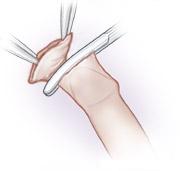CIRCUMCISION:
Male circumcision is one of the oldest and most common surgical procedures worldwide, and is undertaken for many reasons: religious, cultural, social and medically required to treat phimosis. Circumcision is an operation to remove the foreskin of the penis. There is conclusive evidence from observational data and three randomized controlled trials that circumcised men have a significantly lower risk of becoming infected with the human immunodeficiency virus (HIV).
BENEFITS OF CIRCUMCISION:
Since the foreskin traps bacteria and other infectious agents, as well as accumulating malodorous smegma, its removal improves genital hygiene and reduces risk of diseases and other conditions over the lifetime of the man
and his sexual partners.
Circumcision prevents infection and inflammation of the foreskin. And it may decrease the risk of penile cancer.
Reduces by 3-fold the risk of inflammation and infection of the skin of the penis. One in 10 uncircumcised men suffer from inflammation of the head of the penis and foreskin at some time in their lives. This rises to 1 in 3 if theuncircumcised man is diabetic. (Diabetic men also have other severe problems when uncircumcised.) In contrastonly 2% of circumcised men experience such inflammation.
More favorable hygiene for the man’s sexual partner.
Infants who are not circumcised may be more likely to develop urinary tract infections. These infections early in life may lead to kidney problems later in life. Infants who have kidney or bladder abnormalities are at higher risk of urinary tract infections, so circumcision may be advised for these babies.
A circumcised penis that is regarded by most as being more attractive.
In rare circumstances problems can occur with the uncircumcised penis that may require circumcision at an older age. These problems include inflammation of the foreskin or adherence of the foreskin to the tip of the penis. Circumcision during infancy eliminates the possible need for the procedure at an older age.
Circumcised men may have less risk of getting sexually transmitted diseases than men who are not circumcised
Circumcision makes it easy to keep the end of the penis clean. However, the shedding skin cells that naturally accumulate on the glens of an uncircumcised boy are not harmful. Do not try to force the foreskin back to clean the penis of an infant or young boy. Washing externally with mild soap and water is all that is necessary.

